
Little Wonder Records was a United States budget record label from 1914 through 1923. The label was known for producing one-sided records with abbreviated versions of songs at a very low price.

Little Wonder Records was a United States budget record label from 1914 through 1923. The label was known for producing one-sided records with abbreviated versions of songs at a very low price.
Little Wonders were manufactured by the Columbia Phonograph Company, and were distributed exclusively by music publisher Henry Waterson (the business partner of Irving Berlin) in their early years (1914–1916) – an arrangement that has only recently been discovered as the original contract stipulated that both parties were to keep this relationship a secret. [1] Artists are generally uncredited on Little Wonder labels, [2] which simply give recordings general attributions such as "band", "tenor", "quartette", or "accordion solo".
Little Wonders were lateral-cut single sided 5+1⁄2 inch gramophone records. The records contained only about 1+1⁄2 to 2 minutes of music. The small size of the discs (together with the cherubic face on later versions of the label) has led some record collectors to incorrectly assume that Little Wonders were made as children's records; they were actually made for the general audience looking for low-priced recordings.
The records retailed for ten cents each, some of the lowest priced recordings available at the time. This price point revolutionized popular recorded music, significantly expanding the market. The audio fidelity is average to slightly above average for the time, with rather narrow grooves (best played with a smaller stylus than contemporary discs). An estimated forty million of these records were sold, [3] principally through the sheet music counters of many five and ten cent store chains of the time and through Sears Roebuck catalogs, rather than in record stores.
All known Little Wonders were made by artists who also recorded for Columbia. [4] One account says that recording artists would visit the Little Wonder recording studio on one floor of the Woolworth Building before or after making records at the Columbia studio on a higher floor of the same building. There has been some speculation that the masters for Little Wonders were actually warm-up balance checks recorded as tests at the beginning of Columbia recording sessions; if such tests happened to record a usable performance, they would be leased to Little Wonder. [5] However, court papers from an early lawsuit between Waterson and Victor Emerson indicate that performers were paid separately and specifically to record for Little Wonder records.
Little Wonder #1 was "Ben Bolt", sung by Henry Burr, who would make more recordings for the label than any other artist. [6] The vaudevillian Sam Ash made the most recordings as a solo artist, [6] beginning with Little Wonder #98, a version of "Chinatown, My Chinatown". [7] Al Jolson recorded a version of "Back to the Carolina You Love" (1914) on the label; [8] Jolson was a Columbia artist, but this was his only Little Wonder recording. [9] Other noted artists of the day whose performances were released (uncredited) on Little Wonder include Gene Greene, Wilbur Sweatman, [2] Billy Murray, Vernon Dalhart, Frank Crumit, the Louisiana Five and the California Ramblers.
Beginning in 1916 Columbia took full control of Little Wonder, and in 1917 it began issuing small illustrated children's books called "Bubble Books", and were also best sellers. [10] Much later Columbia also issued various promotional discs in the same "small disc" numerical series, but these should not be confused with the Little Wonder label.
Little Wonder #339, "The Camp Meeting Jubilee" by a male vocal "quartette", issued in 1916, contains the lyrics "We've been rockin' an' rolling in your arms / Rockin' and rolling in your arms / In the arms of Moses." This is believed to be one of the earliest uses in an audio recording of the phrase "rock ... and roll", albeit in the context of a religious spiritual. [11] [lower-alpha 1]

Sun Records is an American independent record label founded by producer Sam Phillips in Memphis, Tennessee in February 1952. Sun was the first label to record Elvis Presley, Charlie Rich, Roy Orbison, Jerry Lee Lewis, Carl Perkins, and Johnny Cash. Prior to that, Sun had concentrated mainly on African-American musicians because Phillips loved rhythm and blues and wanted to bring it to a white audience.
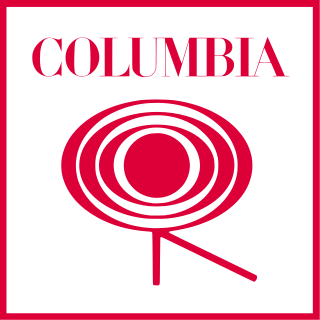
Columbia Records is an American record label owned by Sony Music Entertainment, a subsidiary of Sony Corporation of America, the North American division of Japanese conglomerate Sony. It was founded on January 15, 1889, evolving from the American Graphophone Company, the successor to the Volta Graphophone Company. Columbia is the oldest surviving brand name in the recorded sound business, and the second major company to produce records. From 1961 to 1991, its recordings were released outside North America under the name CBS Records to avoid confusion with EMI's Columbia Graphophone Company. Columbia is one of Sony Music's four flagship record labels, alongside former longtime rival RCA Records, as well as Arista Records and Epic Records.
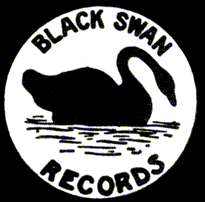
Black Swan Records was an American jazz and blues record label founded in 1921 in Harlem, New York. It was the first widely distributed label to be owned, operated, and marketed to African Americans.. Black Swan was established to give African Americans a label that would give them more creative liberties. Black Swan was revived in the 1990s for CD reissues of historic jazz and blues recordings.

Brunswick Records is an American record label founded in 1916.

Okeh Records is an American record label founded by the Otto Heinemann Phonograph Corporation, a phonograph supplier established in 1916, which branched out into phonograph records in 1918. The name was spelled "OkeH" from the initials of Otto K. E. Heinemann but later changed to "OKeh". Since 1926, Okeh has been a subsidiary of Columbia Records, a subsidiary of Sony Music. Okeh is a jazz imprint, distributed by Sony Masterworks, a specialty label of Columbia.

Columbia Graphophone Co. Ltd. was one of the earliest gramophone companies in the United Kingdom.

The American Record Company was an American record label that was in business from 1904 to 1906.
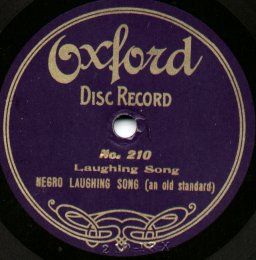
Oxford Records was a record label active in the United States of America from roughly 1906 until 1916. The label was produced for Sears by several labels, including Columbia and Albany Indestructible Cylinders for cylinders and Leeds & Catlin, Zon-O-Phone, and Columbia for discs. No recording activity was undertaken by Sears. All discs were single-sided.

American Record Corporation (ARC), also referred to as American Record Company, American Recording Corporation, or ARC Records, was an American record company.
Discography is the study and cataloging of published sound recordings, often by specified artists or within identified music genres. The exact information included varies depending on the type and scope of the discography, but a discography entry for a specific recording will often list such details as the names of the artists involved, the time and place of the recording, the title of the piece performed, release dates, chart positions, and sales figures.

Bluebird Records is a record label best known for its low-cost releases, primarily of kids' music, blues and jazz in the 1930s and 1940s. It was founded in 1932 as a lower-priced RCA Victor subsidiary label of RCA Victor. Bluebird became known for what came to be known as the "Bluebird sound", which influenced rhythm and blues and early rock and roll. It is currently owned by parent company Sony Music Entertainment.

Benjamin Bernard Selvin was an American musician, bandleader, and record producer. He was known as the Dean of Recorded Music.
Bruce Channel is an American singer-songwriter best known for his 1962 million-selling number-one hit record, "Hey! Baby".

Jack Kapp was a record company executive with Brunswick Records who founded the American Decca Records in 1934 along with British Decca founder Edward Lewis and later American Decca head Milton Rackmil. He oversaw Bing Crosby's rise to success as a recording artist in the early 1930s, and, four decades later, Crosby still gave appreciation to Kapp for diversifying his song catalogue into various styles and genres, saying, "I thought he was crazy, but I just did what he told me." Kapp could not read or sing music, but to his talent he stressed the credo, "Where's the melody?"
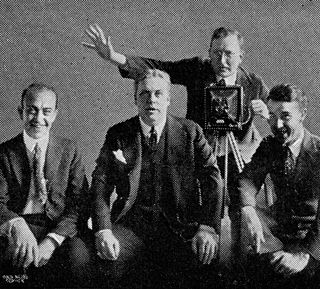
The Peerless Quartet was an American vocal group that recorded in the early years of the twentieth century. They formed to record for Columbia Records, where they were credited as the Columbia Quartet or Columbia Male Quartet. From about 1907, when they began to record for record labels other than Columbia, they were more widely known as the Peerless Quartet.
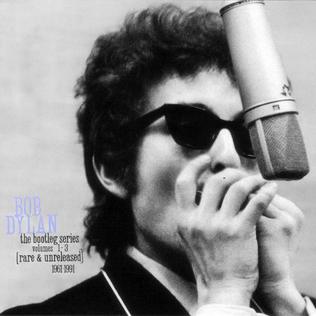
The Bootleg Series Volumes 1–3 is a box set by Bob Dylan issued on Columbia Records. It is the first installment in the Dylan bootleg series, comprising material spanning the first three decades of his career, from 1961 to 1989. It has been certified with a gold record by the RIAA as of August 1997, and peaked at No. 49 on the Billboard 200 and No. 32 in the UK.

Tim Brooks is an American television and radio historian, author and retired television executive. He is credited with having helped launch the Sci Fi Channel in 1992 as well as other USA Network projects and channels.

Harmony Records was a record label owned by Columbia Records that debuted in 1925.

Stephen Carl Porter was an American pioneer recording artist, who recorded prolifically for numerous recording companies in the 1890s and early 1900s. He was also an entrepreneur who helped establish the recording industry in India in the early years of the twentieth century, and successfully marketed a new form of hearing aid.

Albert Charles Campbell was an American popular music singer who recorded between the late 1890s and the 1920s. He was best known for his many duo recordings with Henry Burr, and as a member of the Peerless Quartet and other vocal groups, but also recorded successfully as a solo singer both under his own name and under various pseudonyms including Frank Howard.